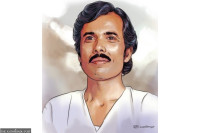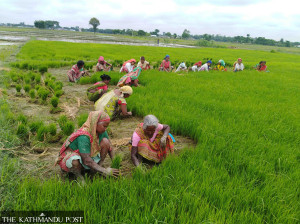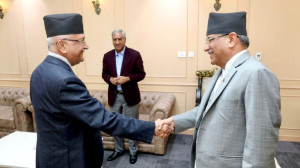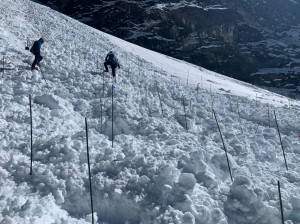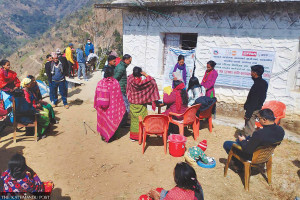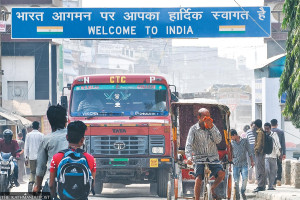 16.12°C Kathmandu
16.12°C KathmanduEntertainment
Through the thick and thin
Former national team captain Gyanendra Malla discusses his early days in cricket, the taste of the grim and glory days, and the bright prospects of Nepali cricket.
Anish Ghimire
A beloved figure in Nepali cricket, Gyanendra Malla, grew up playing cricket with a homemade ball. “Money was scarce,” says the former national team captain, sipping tea to battle a cold evening in Solitmode, Kathmandu. “So, I learned to make my own cricket ball with the help of a friend.”
To make the ball, Malla and his friend bought a newspaper, crushed it into a ball-like shape, and soaked it in water. Once the paper got hard enough, they covered it with cotton, which was only the first layer. Then, the second layer they added was rubber, which made a newspaper into an almost perfect cricket ball. “Even though we didn’t get a proper bounce, it seemed good enough for us at the time,” Malla remembers fondly.
This is how he was first introduced into cricket. In the narrow alleys and chowks of his birthplace, Bhimsensthan, Gyanendra Malla and his fellow cricket enthusiasts played gully cricket. “We used to play wherever we found a little space, and it didn’t matter whether it was night or day,” he recalls. Whether it was broad daylight or a little glow coming from the street lamp, the game went on.
As he watched cricket legends on television, Malla admired their skills and abilities. Eager to emulate them, he began mimicking the actions of international players he saw on the screen. He attempted to replicate shots like the South African legend Jacques Kallis, imitate Sachin Tendulkar’s batting style, and mimic the pull shot of the Australian Ricky Ponting, among others. When it came to bowling, he expressed, “I wanted to experiment with everything. I tried leg-spin, off-spin, and even bowled a few fast-medium deliveries.”
Whenever alone, he curled up a ball inside a sock, hung it on the ceiling and kept hitting it. “My father used to scold me for such desperation to be better at cricket,” he says with a smile.
Slowly, Malla moved away from playing cricket in his chowk and began to play in school and Tundikhel, following in the footsteps of his seniors who used to play in his locality. Despite having his passion, his intention didn’t lean towards playing for a club or trying for the national team. “At the time, I had no idea about selections. All I knew was that I had to play cricket. The situation or scenario of playing didn’t matter,” he says.
In his school days, when former national team captain and current secretary of the Cricket Association of Nepal, Paras Khadka and others went to try out for the under-15 category for Kathmandu district, Malla says he had no idea about professionally pursuing the sport. He reveals, “It was only later when I began playing for Yangal club, that I discovered players like me could be chosen to compete at domestic and international levels.”
While representing Yangal Club, Malla gained significant exposure by progressing through club selections, moving on to district selections, and ultimately making it to the national team camp. When he was playing for the district levels, he was selected as a batting all-rounder, as he rolled his arms for an occasional leg-spin as well. “But as I transitioned into the senior team, I focused more on my batting,” says the former captain. He stepped in as a wicketkeeper whenever required by the team.
Malla’s impact has been indisputable at every level since joining the Under-15 team. In the U-19 2006 World Cup in Colombo, he struck an undefeated 46 in the Plate semi-final against a South Africa captained by Dean Elgar, as his team shocked the Proteas by two runs. In the Plate final, Nepal would surpass New Zealand with a side that included future stars like Tim Southee, Colin Munro, Martin Guptill and others.
Even though the future looked bright and the passion was there, the other side of things, like career prospects and earnings, didn’t look all that promising. “While we were in the camp, back in 2005-06, we used to get an allowance of Rs25,” recalls Malla. When the team went on international tours and played games there, the Asian Cricket Council (ACC) and International Cricket Council (ICC) gave them 25 dollars per day. He said, “With that amount, except breakfast, we had to cover all our expenses. If there was any money left, we brought it home.”
Despite this, Malla and his colleagues persevered, hoping for a brighter future. However, as they matured, family responsibilities began to pile up, and the feeling of being “underpaid” set in. “We didn’t have many matches back then. In a year, we used to play two to three games, and also, we had no sponsors, so money was tough,” says Malla. CAN had a few bats, and players shared the bats with one another while playing.
The recently added facilities at the TU International Cricket Ground in Kirtipur have proven beneficial for players. However, Malla remembers, “In our days, there was a ground and a pitch—that’s all. There weren’t even sufficient balls for us to train.” Despite the limited resources, players dedicated themselves, fueled by passion and a sense of pride, to representing Nepal at the international level. Malla also shared, “At lunchtime on the ground, we were given a few pieces of meat, that too, with the portion carefully measured.”
Looking back at it, Malla said they weren’t “struggles” but were “duties” for the national team.
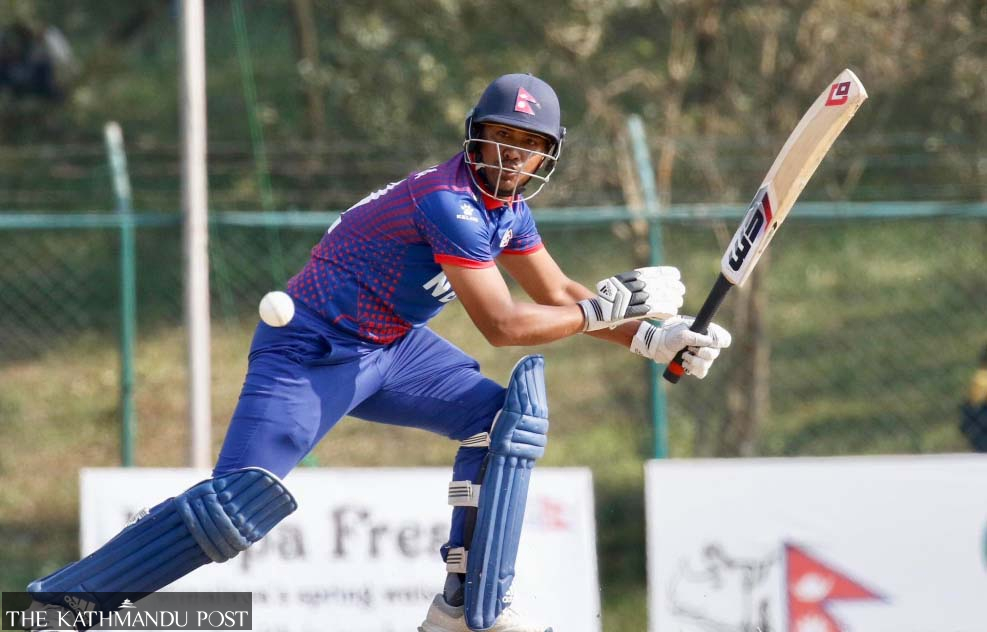
With little improvement in sight, increasing family responsibilities and his career going nowhere, Malla applied for a visa to work in Australia, but fate had other plans, and the visa got rejected.
Looking back at his many memorable personal highs, one standout for Malla is his record-breaking fastest half-century for Nepal in One-Day matches—achieved against Saudi Arabia in the 2012 ACC Trophy Elite—in just 17 deliveries. He also holds the record for hitting six boundaries in a single over. Malla also had crucial knocks in clutch situations, which included his 86 runs against Canada in the 2015 Cricket World Cup Qualifier, although it came in a losing cause as Canada snatched the game by twelve runs. Also, his 66 runs with a strike rate of 101.53 came at the right time against the United States in the Division Four final of 2012, which resulted in a win for Nepal.
Then came the 2014 WT20, which was Nepal’s debut entry in the World Cup and in the first game against Hong Kong, Malla was the top scorer with 48 runs and formed a crucial partnership with captain Khadka, who also made 41 runs.
“The feeling of playing in a World Cup, singing the national anthem in a big stadium, and seeing the Nepali supporters on the stands was definitely one of the greatest memories of my career,” says Malla.
The heroics of the bowlers grabbed Nepal a win in their first WT20 appearance. Even though Nepal couldn’t proceed further, they fought well in the group stages. Malla amassed 83 runs in three innings with an average of 27.66 in the tournament.
When asked about the pressure he felt during that time, he responds, “Like most batters, I was in a zone of focus. While batting, your focus should be on putting the bat on the ball. I didn’t let any other thoughts come to me.”
Other memorable instances, according to Malla, were receiving the One Day International (ODI) status in 2018 and playing at the Home of Cricket, Lord’s, for the first time in 2016. “After the World Cup, receiving ODI status is another great memory to look back on for me,” Malla says. “Receiving ODI status is one of the steps in being a full-member cricket nation. So it was a big moment for us,” he adds.
Reflecting on playing at Lord’s Cricket Ground in London, UK, which is called the ‘Mecca of cricket’, Malla says he felt like he was in a cricket museum. The atmosphere was something else there. Playing in front of Marylebone Cricket Club (MCC) members and receiving the chance to tour Lord’s was dream-like.” On July 19, 2016, Nepal made its cricketing debut at Lord’s, defeating MCC by 41 runs in a 50-over match.
As captain and vice-captain, Khadka and Malla saw Nepal through many years of hardships. For as long as one can remember, Malla served as Khadka’s deputy before taking over as captain in 2019. Under his leadership, Nepal won bronze at the 2019 Asian Games.
Now retired and having handed the responsibility to the young bunch who have been showing great promise, Malla remains committed to contributing to Nepal cricket in any way he can. He is actively engaged in the Cricket Excellence Center, where he mentors and trains young cricket enthusiasts.
“Nepal cricket is gradually reaching new heights, and to continue this progress, we need all the support we can get. Cricket is now a promising sector for investment, offering great returns,” says Malla, who, we can all agree, left Nepal cricket a bit better than when he found it.






